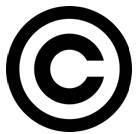Why license your music at all? You license your music so that you can be properly compensated for the use of your work; or to put it in other words, licensing your music is the foundation of making money in the music business.
Don't confuse "licensing" your music with music "copyright". You can copyright your music if you wish, but it's often unnecessary since you, as the "creator of the music", automatically own the music as your intellectual property. Put simply, copyright is the legal term used to declare and prove who owns the intellectual property (the music, lyrics, etc) while licensing is the legal term used to describe the terms under which people are allowed to use the copyrighted material.
So... a license provides the right - granted by the copyright holder - for someone to broadcast, recreate or perform a recorded copy of your (note: Most music licensing agreements include some form of compensation to the copyright owner.)
Each of the platforms you are looking to sell your music through should make their license available to you.
Right, now I’m going to ‘should’ on you. If you are contemplating working with a music outfit, you 'should' read the license agreement! Yes, a license agreement is typically written in legalese, and if you're even only half human you'd probably prefer to chew razorblades than read a legal agreement. But stick with it, because the more you learn, the more you'll understand, the better prepared you'll be, the less surprises you'll be in for.

Better still, if you have a friend with a legal background, ask them to work with you and help you review the license agreement and become familiar with the terms.
And as a final option to help you get around the leagalese, you can find common music licensing terms HERE and a good list of music licensing definitions HERE.
General types of music licenses include: Synchronization, Public Performance, Mechanical.
- Synchronization: Your track is synchronized with video. This can be a TV commercial, movie, YouTube video, etc
- Public Performance: Your track is publicly performed on the radio, the internet, sports arena or retail store
- Mechanical: Your track is being delivered to the end user (either digitally or physically) in a format they can take with them. Think vinyls, tapes, CDs, iTunes and other digital formats
You can Google ‘music license agreement example’ to find examples of agreements. One site that contains agreement examples is given HERE.
That's the most basic idea of music licensing. Keep on rockin' !
Blog by the MelodyFusion Team

